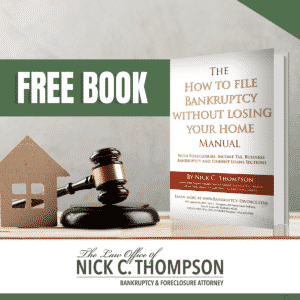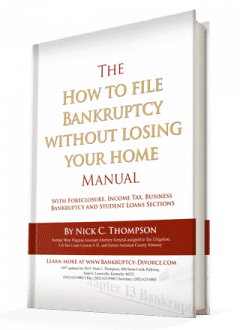You have several options if you lose your job or become unable to work during Chapter 13. It is common to suffer a job loss and miss plan payments. It is in your best interest to plan for what will happen and contact your bankruptcy lawyer as soon as possible.
It can take time to find new employment. You may have to stop paying plan payments due to a job loss and medical bills. The bankruptcy code allows you to take time off by modifying your chapter 13 bankruptcy plan.
We expect something to happen, from illness to death in the family or a divorce. If you have an income loss and the plan becomes difficult, you can often modify the plan. Doing it correctly can keep the bankruptcy relief you need and not have your repayment plan fail.
Court Dismissal for Not Maintaining Payments
If the plan is not paid timely and no modifications are made to the plan, the bankruptcy court will issue a dismissal. When you file the case, the court issues a confirmation order, making your plan payment a requirement. Upon complementing the plan, the court issues a discharge which is the permanent order barring creditors from collecting.
The Chapter 13 confirmation order is not written in stone, but if the order is violated, both the debtor and the creditors can be punished. The typical result when the debtor does not make plan payments and ignores the order is to dismiss the case throwing the debtor out of court. The home goes back to foreclosure court for sale, and the debtor is often barred from filing a second case for 180 days. This statute is 11 USC 109(g)
Payment can be decreased for a time or increased. A step plan allows a low monthly plan payment which increases later. The plan can be suspended, but it later will have to increase.
Creditor Motions for Relief from Stay
Your confirmation order will also set out if payments are made directly to secured creditors like your mortgage or car payments. These payments usually start the minute you file a bankruptcy case.
Your confirmation order typically requires you to make payments to secured creditors. If you fail to make timely payments, a secured creditor can ask for the stay to be terminated. If you are behind in mortgage payments, the mortgage company can return to state court and commence foreclosure proceedings again.
The same happens with car loans, where if the monthly payments are not made, the car lender can ask for the stay to be terminated so the car can be repossessed. Remember that your second mortgage can also file a motion for relief from stay.
Modifying the Order of Confirmation to Avoid Fees
If debtors contact their bankruptcy lawyer when this starts, it is relatively easy to modify the confirmation order. If the creditor is allowed to file the motion for relief from stay because you missed payments on the home or car, the creditor is allowed to charge for their court costs and attorney fees. This is often over 1,000 dollars for that debt. That is a serious late charge. If the Trustee files a motion to dismiss the case for not paying the plan, there is no cost to that.
Avoid this cost by modifying the confirmation order early, allowing you to miss payments and catch them later. Ignoring the problem of not letting your bankruptcy attorney take care of this will be expensive and have results no court order later can correct and perhaps insure the loss of a home.
Modify the Plan
The worst possible results come from not making payments to a secured creditor. If the creditor obtains an order to terminate the stay, you will often not be allowed to file a second case to stop a foreclosure sale within 180 days after the case is dismissed.
The debtor can then be trapped in a Chapter 13 bankruptcy, which keeps him from saving a home or auto while a foreclosure is processed.
By modifying or suspending payments to the trustee, you can often make the mortgage and car payments. Selling exempt property is often not the answer. It can prevent you from converting to Chapter 7 or refiling if the court does not provide consent to liquidating assets.
Early Discharge
Towards the end of your plan, you can often obtain an early discharge if your plan has made all of the funds a Chapter 7 bankruptcy would have paid. You essentially will qualify for a Chapter 13 discharge, although not all of the plan was paid. The judge will refuse this unless you are in the final stages of your plan.
You are required to make your best effort to complete the plan. But when circumstances take over and do not allow you to complete the plan, you may qualify for an early discharge. The debtor must pay their disposable income into the plan to obtain debt relief. As long as:
- These circumstances are not your fault and prevent you from completing the plan.
- The plan paid all that a Chapter 7 would have.
- The debtor has substantially made most of the Plan payments.
Then the debtor generally qualifies for an early discharge
Conversion from Chapter 13 to a Chapter 7
If you have a low total monthly income, you qualify for Chapter 7 bankruptcy relief. It becomes possible to repay nothing to unsecured creditors. Losing regular income temporarily may be a blessing in disguise that allows you to eliminate personal loans and medical debt.
If you only need to catch up on a mortgage after this, chapter 7 will provide four months or longer of no Chapter 13 plan payments, and you will later refile Chapter 13 to catch up on a mortgage.
Refiling Your Chapter 13 Bankruptcy
A Chapter 13 bankruptcy has limits.
- The Chapter 13 bankruptcy plan must repay secured and priority debts such as income taxes less than three years old.
- The Chapter 13 bankruptcy plan must pay all of the disposable income.
- The Chapter 13 bankruptcy plan must repay what Chapter 7 would have repaid from selling nonexempt assets.
Your repayment plan can have other repayment plan provisions. Property can be liquidated as part of the plan to repay creditors.
Lowering the Chapter 13 Plan Percentage
The bankruptcy process also allows you to lower a plan percentage. Three factors affect how much your plan payment is. Your bankruptcy case may have required a 100% to 70% repayment because your income was high. If your new job income drops, the plan percentage can be lowered.
If your plan had a high payment because the estimated value of assets was high, sales proceeds might be applied to the plan to complete the bankruptcy plan. The Chapter 13 bankruptcy case requires the plan to pay what a Chapter 7 does, and a Chapter 13 must repay certain debts during the plan. But as long as the bankruptcy will pay the nonexempt property value and available income, the percentage can be lowered.
Chapter 13 Plan Dismissal
Chapter 13 is not slavery. You are not required to stay in Chapter 13. If you know the bankruptcy judge will dismiss the case or that a creditor will file a motion for relief from stay, it may be better to ask for dismissal before they file a dismissal.
If you dismiss before they file a motion for relief from stay, you can refile your case later without being required to wait 180 days after it is dismissed.
Refiling cases in bad faith will cause other problems, but sometimes it is best to dismiss and refile later.
Your Bankruptcy Lawyer Can Help You in Making the Right Decisions!
Talk to your attorney if you say what I will do if I lose my job. Hopefully, you hired a quality attorney. He is professional help with the knowledge and skill to get you through this.
This involves confidential information with important dates and deadlines. Do it wrong, and it can be a disaster. To properly discharge the debts, people file modifications as a part of the normally available services you can expect from the attorney-client relationship. Supplemental terms can be added to the plan to discharge your debts.
If you have chosen an attorney based on marketing purposes, the attorney-client relationship may not be a quality one when you suffer job loss.
Contact Nick Thompson about Missed Payments from Job Loss
Every bankruptcy attorney is a debt relief agency. We design Chapter 13 plans to eliminate unsecured debts. If you have recently lost your job and are stuck in a financial situation without enough income, we give a free evaluation with a confidential relationship at our law firm. Never choose a lawyer because of attorney advertising.
Attorneys evaluate a debt relief payment plan and lower payments when your new income cannot pay a Chapter 13. You will need more than a new job to save your bankruptcy case. Rather than worry about how I lost my job, plan the bankruptcy issues so the total debt is discharged and pay a smaller, affordable plan payment.
Seek assistance from a professional attorney if you have missed payment from job loss and what to figure out a new plan payment.
Resources for Bankruptcy
Louisville, Kentucky Bankruptcy Forms
How to Win Great Chapter 13 Plan Payments • Video
Filing Chapter 7 & Chapter 13 Bankruptcy
Means Test Qualifying for a Kentucky Chapter 7
How to Get an Affordable Chapter 13 Budget • Video
If you need to file bankruptcy, don’t delay because timing is crucial. I am here to help you. So, contact my office immediately to start the conversation with Nick C. Thompson, Bankruptcy Lawyer: 502-625-0905.



